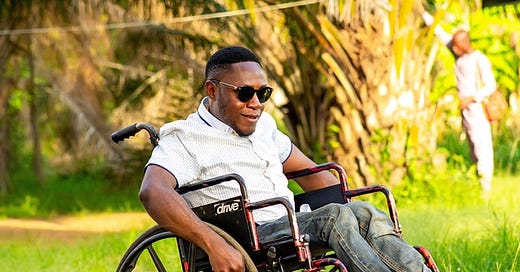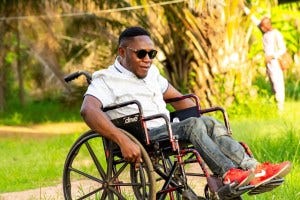It is essential to distinguish two types of illness from each other. Most of us will occasionally get a virus or a different infection. However, these pass, and we continue our lives as before. Then, there is the type of illness characterized by permanent disability. It is a permanent disability that is very damaging both physically and emotionally.
The human spirit craves autonomy, so we have an innate desire to control our lives. We want to be the ones making decisions that affect our future and shaping our destiny. In this context, autonomy refers to acting and making choices independently, without external interference or influence. This need for independence is often seen as a fundamental aspect of human nature, as it allows us to express our individuality, pursue our goals, and live according to our values and beliefs. We desire to feel like the captains of our destinies, steering the ship of our lives through the currents and storms of fate. But what happens when the helm feels loose in our grasp? Losing control is a profoundly unpleasant and unsettling experience.
Losing autonomy means losing freedom. That breeds anxiety and fear. The unknown becomes a vast, terrifying landscape with potential dangers and pitfalls. We worry about what might come next, and the uncertainty gnaws at our sense of security and stability. This constant state of apprehension can be incredibly emotionally and mentally draining.
Lack of control also affects our motivation and engagement. If we don't believe our actions have any meaningful impact on our lives, why bother striving for anything? This can lead to apathy and a sense of purposelessness. We become spectators rather than participants, passively observing the world unfolding.
The feeling that we have lost independence can negatively affect our relationships. When we feel like we have no control over our lives, it becomes easy to distrust others and be reluctant to let them in. That can lead to feelings of isolation and loneliness, further deepening the emotional burden of our situation.
Regaining a sense of control, however, is a feat. By focusing on the areas we can influence, setting achievable goals, and practicing self-compassion, we can gradually empower ourselves and reclaim the agency we deserve. Remember, even in the face of uncertainty, we can choose our responses, shape our perspectives, and, ultimately, steer our lives toward a more fulfilling destination.
The impact of illness extends far beyond the physical. Our emotional state becomes hostage to fluctuating symptoms and unpredictable flares. The ever-present threat of relapse can cast a long shadow over our lives, fostering anxiety and fear of the unknown. This emotional vulnerability can make it challenging to engage in activities we once enjoyed, further isolating us from the world.
The most insidious aspect of the lack of control brought on by illness is the erosion of our sense of self. People who become ill feel that their sickness defines them. Identities become intertwined with the labels and diagnoses attached to our illness. It leads to feelings of helplessness and despair. People who become ill struggle to reconcile the person they once were with the person they have become.
However, despite the overwhelming sense of powerlessness, it is essential to remember that our illness does not define us. Even in the face of adversity, we can control aspects of our lives. We can choose how we react to our circumstances, nurture our relationships, and practice self-compassion. By focusing on these areas, we can cultivate a sense of inner resilience and regain control over our lives.
The journey through illness is undeniably tricky, demanding immense courage and strength. It is a journey marked by uncertainty and loss but also a journey of transformation and discovery. By embracing the challenges and learning to navigate the limitations imposed by illness, we can emerge more robust, resilient, and with a deeper appreciation for the precious gift of health.
Losing control in old age is challenging. Aging is a natural and inevitable process that affects us all. As we age, our bodies and minds undergo changes that can significantly affect our sense of control and self-determination.
One of the most immediate effects of aging is the erosion of our physical autonomy for many people. Some remain physically healthy throughout their lives. However, for people who are not so lucky, the once agile and responsive bodies become subject to limitations and unpredictable demands. Simple tasks like climbing stairs or carrying groceries become more challenging, and we may need help from others to perform them.
The impact of aging also extends to our emotional state. As we face the realities of limited time and declining physical abilities, we may experience anxiety and fear of the unknown. Losing independence and realizing that we cannot control certain aspects of our lives can be deeply unsettling, leading to helplessness and despair.
The sense of losing control can also affect our relationships. As we age, we may become more reliant on family and friends for help, leading to feelings of guilt or burden. As our social networks change, We may feel isolated or disconnected from others.
Physical limitations become a daily reality. Strength wanes, mobility diminishes, and chronic ailments may appear. This dependence on others for even basic tasks can be intensely frustrating, eroding our hard-won self-reliance. The once familiar tasks become arduous journeys, each step a reminder of the limitations imposed by time and circumstance.
Social isolation, often a consequence of retirement or losing loved ones, can further exacerbate the feeling of disconnection. The absence of meaningful interactions can fuel loneliness and exacerbate existing health issues. The bustling social circles of the past may fade, leaving a void where connections and laughter once thrived.
The fear of cognitive decline, with its potential impact on memory, decision-making, and independence, adds another layer of anxiety. The specter of dementia can loom large, casting a shadow over the future and leaving older people grappling with a sense of helplessness. The memories that defined us may become elusive, the sharp wit dulled, and the path forward shrouded in uncertainty. Family members inaccurately perceive the older person as becoming demented because of the fear of cognitive decline.
Ageism and societal expectations can further diminish our self-reliance. What older people hear is that they are incapable. It feels to them like their voices are unheard and their opinions dismissed. This infantilization can be profoundly demoralizing, chipping away at our self-worth and sense of control. The wisdom gleaned from years of experience may be disregarded, and our contributions deemed insignificant in the face of a changing world.
Financial concerns, particularly rising healthcare costs and fixed incomes, can be a significant source of stress. The prospect of supporting adult children or grandchildren can add another layer of worry, leaving us feeling powerless and uncertain about the future. Concerns about financial security and challenges may overshadow our dreams for retirement.
Facing the unknown, particularly the prospect of death is a daunting experience. The fear of the inevitable can lead to anxiety and a desperate desire to cling to whatever control remains. The once vibrant world may appear to shrink, the future filled with uncertainties that can be overwhelming.
The quote "Old age is not for Sissies" is attributed to the American actress Bette Davis. Another version of that idea is "Gettin old ain't for wimps." The expressions emphasize that aging is a complex journey. It requires a willingness to confront the inevitable challenges of advancing years.





At Sixty nothing could stop me, at Sixty Seven,with three bulging discs in my neck,arthritis in my neck and spine, I cant even do 20 percent of what I could before, after Covid it just accelerated.
Excellent article on aging. I'm not sure I would have - or could have - appreciated how true the article is until recent years.